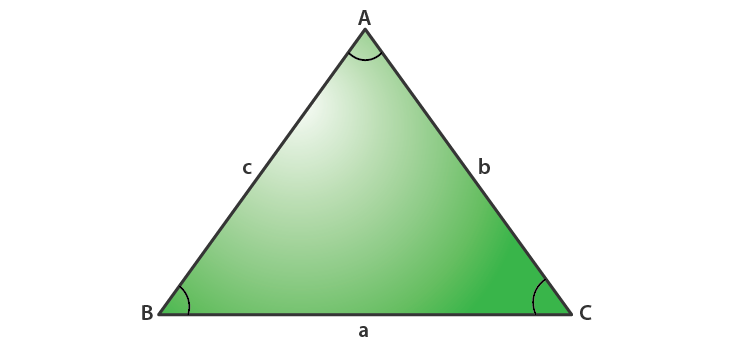Law Of Tangents
The laws of tangent (Law of Tan) describes the relation between difference and sum of sides of a right triangle and tangents of half of the difference and sum of corresponding angles. It represents the relationship between the tangent of two angles of a triangle and the length of the opposite sides. The law of tangents is also applied to a non-right triangle and it is equally as powerful like the law of sines and the law of cosines. It can be used to find the remaining parts of a triangle if two angles and one side or two sides and one angle are given which are referred to as side-angle-side(SAS) and angle-side-angle(ASA), from the congruence of triangles concept.
To understand the law of tangents in a better way, you need some pieces of information for a general triangle even it may or may not be a triangle. The four cases involved are:
- Two sides and one opposite angle
- One side and two angles
- Three Sides
- Two sides and the angle between them
Formulas For Laws Of Tangents
Let us assume a right triangle ABC in which sides opposite to \(\angle A,\angle B, and \angle C\) are a, b and c respectively. Then, according to the laws of tangent, we have the following three relations :

\(\frac{a-b}{a+b}=\frac{\tan (\frac{A-B}{2})}{tan(\frac{A+B}{2})}\) ….(1)
Similarly for other sides,
\(\frac{b-c}{b+c}=\frac{\tan (\frac{B-C}{2})}{tan(\frac{B+C}{2})}\) …..(2)
\(\frac{c-a}{c+a}=\frac{\tan (\frac{C-A}{2})}{tan(\frac{C+A}{2})}\) …..(3)
Since tan (-θ)= -tan θ for any angle θ, we can switch the order of letters in the above law of tangents formulas and can be rewritten as:
\(\frac{b-a}{b+a}=\frac{\tan (\frac{B-A}{2})}{tan(\frac{B+A}{2})}\) ….(4)
Similarly for other sides,
\(\frac{c-b}{c+b}=\frac{\tan (\frac{C-B}{2})}{tan(\frac{C+B}{2})}\) …..(5)
\(\frac{a-c}{a+c}=\frac{\tan (\frac{A-C}{2})}{tan(\frac{A+C}{2})}\) …..(6)
The formulas (1), (2), and (3) are used when a>b, b>c, and c>a, and the formulas (4), (5) and (6) are used when b>a, c>b and a>c.
Laws Of Tangent Proof
To Prove: \(\frac{a-b}{a+b}=\frac{\tan (\frac{A-B}{2})}{tan(\frac{A+B}{2})}\)
Proof:From the law of Sine,
\(\frac{a}{\sin A}=\frac{b}{\sin B}=\frac{c}{\sin C}\)Use first and second relation,
\(\frac{a}{\sin A}=\frac{b}{\sin B}=k\) , (say)a = k sin A and b = k sin B
From this,
a – b = k (sin A – sin B)
a + b = k (sin A + sin B)
So, we get
\(\frac{a-b}{a+b}=\frac{\sin A-\sin B}{\sin A+\sin B}\) ………(1)Identity Formulas for Sine are:
\(\sin A-\sin B={2\cos \frac{ A+B}{2}}{\sin \frac{A-B}{2}}\\ \sin A+\sin B={2\sin \frac{ A+B}{2}}{\cos \frac{A-B}{2}}\)Substitute those formulas in equation (1),we get
\(\frac{a-b}{a+b}=\frac{{2\cos \frac{ A+B}{2}}{\sin \frac{A-B}{2}} }{{2\sin \frac{ A+B}{2}}{\cos \frac{A-B}{2}}}=\frac{\tan \frac{A-B}{2}}{\tan \frac{A+B}{2}}\)Hence Proved.
Practice problem
Question :
Solve the triangle \(\bigtriangleup ABC\) given a=5,b=3 and ∠C=96° and find the value of A – B.
Solution :
We know that,
∠A + ∠B + ∠C = 180°
∠A + ∠B= 180°- ∠C = 180° – 96° = 84°
By law of tangents,
for a triangle ABC with sides a, b and c respective to the angles A , B and C is given by,
\(\frac{a-b}{a+b}=\frac{\tan (\frac{A-B}{2})}{tan(\frac{A+B}{2})}\)Therefore,
\(\Rightarrow \frac{5-3}{5+3}=\frac{\tan \frac{1}{2}(A-B)}{\tan \frac{1}{2}(84^{\circ})}\) \(\Rightarrow \tan \frac{1}{2}(A-B)=\frac{2}{8}\tan 42^{\circ}=0.2251\) \(\Rightarrow \frac{1}{2}(A-B)=12.7^{\circ}\)A – B = 25.4°
Register with BYJU’S -The Learning App to get more information about maths-related articles and start practice with the problems.